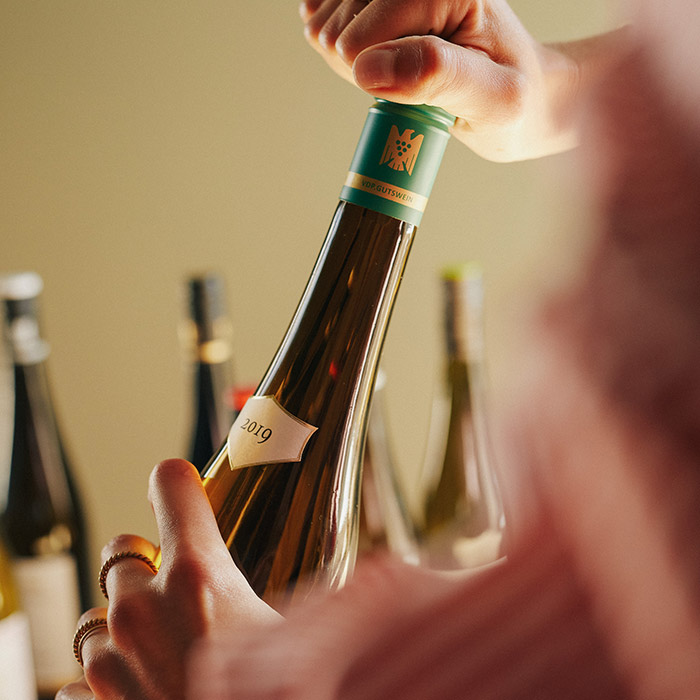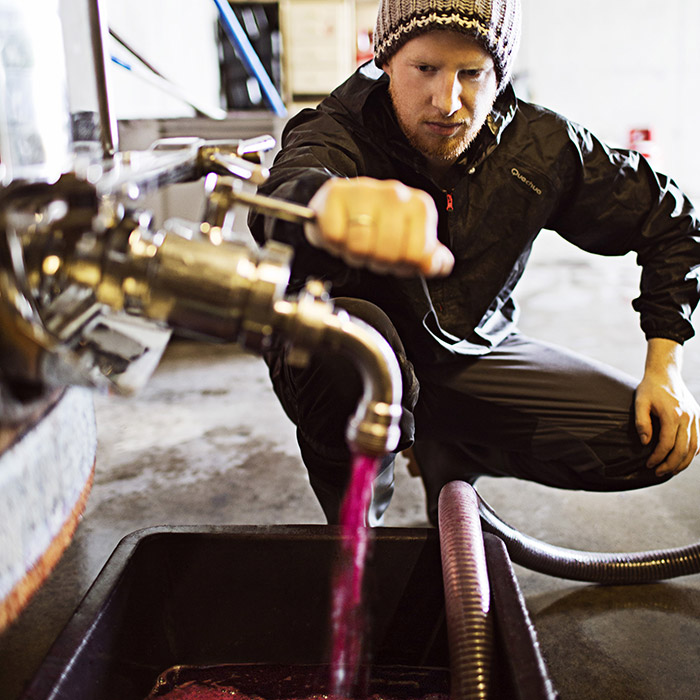As early as 2021, the VDP made the decision to have all member wineries certified on guidelines for sustainable work by 2025. This year is half-time. How are things progressing?
Theresa Olkus: There are different speeds. We have companies that were already certified before we made the decision. Others have been less involved in the process. It is a process. Our goal is for everyone to be on the same level. I can imagine that by the end of the year we will be close to half of the businesses.
Which aspects of sustainability are particularly important to you?
Theresa Olkus: We set ourselves a sustainability milestone every year. Last year it was the lighter bottle for estate and local wines, which now weighs only less than 430 grams instead of over 500 grams before. We have made quite a lot of progress on that. In my experience, hardly any other bottles are used for estate and local wines - provided there were no supply problems. We are also working on being able to save almost 25 per cent of the weight of the bottle for Grosse Gewächse (GG), which weighs about 700 grams. Currently, prototypes are being produced that weigh about 550 grams. We are aware, however, that in purely quantitative terms it does not have the significance of estate wines, because here the quantities are greater than for GGs. It is a signal for the fine wine sector in particular. But it is very important to us not to define ourselves by the weight of the bottle - after all, it is the content that counts. The light GG bottle will soon be in use.
The international trade chains that have joined forces in the Sustainable Wine Roundtable (SWR) are responsible for millions of bottles and have set very concrete goals for the use of lighter bottles. They are lighter than those of the VDP.
Theresa Olkus: We are fully involved in the discussions in the SWR and work there. But the biggest problem at the moment is the availability of bottles. But we also know that the bottle is one of the biggest levers to save CO2 in wine production. And our members are very open to this. This topic, also the reduction of the variety of bottles, is under discussion with us. First we have to find out how many different bottles our wineries use. A survey is underway for this purpose. But we are thinking ahead in any case.

The production of bottles produces the most CO2 in viticulture. The VDP therefore wants to reduce their weight.
© VDP - Peter BenderDoes the resolution oblige the VDP wineries to use the lighter bottles? Or is it just a recommendation?
Theresa Olkus: On the one hand, the resolution is obligatory for the members and will be checked. On the other hand, we cannot force our members to do anything in this acute bottle shortage.
What is the VDP's position on the concept of a deposit system for wine bottles?
Theresa Olkus: If it is feasible: why not? I know it from my childhood in Württemberg, where we always returned the litre bottles. The cooperatives there recently introduced a system for the 0.75l bottle. I find that super-exciting. With the amount of bottles that the cooperatives there work with, such a system works. In comparison, we work on a rather small scale. And we use a lot of different bottles.
That sounds sceptical.
Theresa Olkus: The details, including water management and rinsing, have to be clarified. Because we are not yet at the point of having thought it through completely. One of the big question marks, for example, is export: At the moment, all producers have to take back their bottles. On the Mosel, some of our wineries have an export share of 70 to 80 percent.
Do you have an answer?
Theresa Olkus: I am personally of the opinion: The VDP alone cannot pull this cart. When thinking about implementation, we need a system that works for all German wine producers. There would have to be an initiative of all institutions of German wine - also in cooperation with the Geisenheim University of Applied Sciences, which develops and examines plans for the possible implementation of a deposit system: When, where and in what form is it sensible and really sustainable.
Beer brewers have long since established a return system - despite very different bottle shapes.
Theresa Olkus: So have the mineral water producers, but they sell different quantities. But we are concerned with much more than just the glass bottle. That's why we have already changed our brand image: In the past, the eagle was always on the capsule as a distinguishing feature. But if a winery wants to do without the capsule or seal the bottle with wax, we don't want to be the brake. Then the eagle has to be on the label. We have also developed sustainable specifications for paper banderoles that work well. We are also discussing sustainable labels and many other aspects with our label partner. There will be changes there, too.
Apart from bottles and deposits, what other topics are you concerned with?
Theresa Olkus: We are working on a manifesto for social sustainability. One of the biggest problems in winegrowing at the moment is the lack of staff. The VDP is one of the largest institutions for training in viticulture: two out of three wineries train apprentices. Joachim Heger in the Kaiserstuhl region, for example, now has at least 80 trainees, some of whom are running great businesses themselves today. Those who want to become winemakers also very often have the plan: I'll do at least one year of training in a VDP winery. After that, I'll work in a sparkling wine house, for example, or in a business with a different orientation.

The shortage of staff is also hitting VDP wineries hard. That's why Theresa Olkus asks: "How can we manage to make the profession of winemaker attractive again?"
© German Wine InstituteNevertheless, trainees are also urgently needed in VDP wineries.
Theresa Olkus: How can we make the profession of winemaker attractive again? A passion for wine alone is not everything. There must be more incentives to motivate young people to want to work in this industry. To this end, we want to learn from other sectors: How do we manage to make more flexibility and better pay possible, for example? Good health care for employees has also not yet arrived in agriculture and viticulture. We are currently conducting surveys on this and can imagine that our next milestone will relate to social sustainability.
According to almost all experts, sustainable viticulture is linked to the cultivation of Piwi grape varieties. What is the VDP's position on this?
Theresa Olkus: If you look at our mission statements, we are advocates of grape varieties that have their tradition in Germany and produce a good result in appropriate locations. But there is an openness and some wineries are experimenting with piwis. The Weingut am Stein in Franconia is already working with it, and Lämmlin-Schindler in Baden has even planted ten to 15 percent of its vineyards with Piwis. But we don't yet know which Piwi grape varieties will develop terroir potential. For me personally, progress in the wine industry is too slow in many things; on the other hand, we have no patience with many topics. We don't know enough about Piwi grape varieties yet. We have to gain experience with them and first work out taste and terroir profiles.
The founding fathers of the VDP had to gather very similar experiences from 1910 onwards. Isn't the cultivation of Piwis the continuation of this tradition?
Theresa Olkus: We don't give anyone the recommendation to switch to so-and-so percent Piwi grape varieties. That is up to each winery. It is still too early to commit: This wine shows this potential in this terroir. Besides, we want to limit which grape varieties are used in which vineyard. I am not a professional taster, but for me, grape varieties such as Pinot Noir, Riesling, Silvaner and Chardonnay show the terroir on which they have grown. With other grape varieties, such as Piwis, I have a hard time with this sensorially. At the moment, I think Piwi wines have a great chance in entry-level wines and particularly drinkable cuvées that are offered at entry-level prices in grocery stores, for example. If we were able to position Piwis there in larger quantities, we would already have won a lot for our profile.
So for you, the approval of a Piwi grape variety as a "Großes Gewächs" is a generation project?
Theresa Olkus: The generations after us will be able to tell whether this will succeed. For estate wines, we can now gain very good experience and thus take the next steps. First we have to find out: What makes sense in which place? And why should we replace traditional varieties that make Germany unique? Is that more sustainable? We don't want to have many more grape varieties either. In some areas it is already rather too much for us.